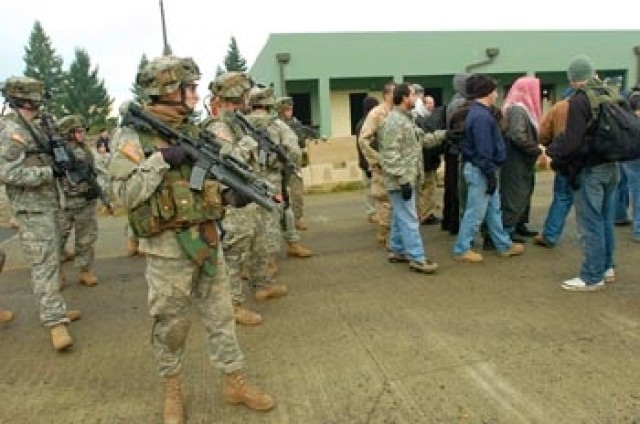In military training, deja vu is a good thing.
Soldiers assigned to the next Stryker brigade combat team to deploy to Iraq will likely arrive next summer at Operation Iraqi Freedom with the familiar feeling they have already performed the same missions and operations.
Fourth Brigade, 2nd Infantry Division war planners hit the mark for realism in replicating the conditions under which Soldiers will operate in OIF with "Cascadian Commitment," the field training exercise that ended Wednesday. The FTX introduced challenges common to urban operations in Iraq, but seldom experienced in training. The exercise co-opted the facilities and infrastructure of Fort Lewis to infuse a unique degree of realism into its operations.
"Here at Fort Lewis you have a functioning, living city," said 4th Brigade spokesman, Maj. David Downing, "which is exactly what we're going to experience when we go to Iraq. And so this is actually going to be probably more important for us (than National Training Center.)"
The brigade is scheduled to train at NTC at Fort Irwin, Calif., in February 2007, for certification before deployment to Iraq.
Stryker Soldiers conducted 24-hour operations for more than a week to execute an ambitious set of tasks in Cascadian Commitment. Convoys of Strykers drove for hours throughout the region before arriving to perform their "out-of-sector" missions. Units moved into villages and quickly assessed threats using specialized teams and equipment. Leaders used their knowledge of indigenous culture to defuse tense situations and gain intelligence. They employed the 80 language-enabled Soldiers in the brigade to read signs and translate Arabic greetings. Soldiers manning traffic control points dealt with impatient, sometimes indignant motorists chafing at perceived intrusions.
"The units have experienced the friction that everyone predicted," said 4th Bde. public affairs officer, Capt. Mike Garcia. "Friction with the size of this operation. We knew they'd have some friction associated with moving so many vehicles in traffic up and down the highways. We knew there would be some friction and challenges in establishing their (Forward Operating Bases).
"These are all what units do in Iraq," he said. "But it's good because it's the first time we've done it on such a large scale, and that's exactly the kind of friction they're going to see in theater. Overall, it's gone really well."
The brigade put on an impressive show Dec. 7 during a media event at the mock city on Fort Lewis. Elements of 4th Battalion, 9th Infantry Regiment carried out a textbook operation at Leschi Town. On the hunt for a possible bomb production and storage facility, leaders interacted with Arabic-speaking role players while sending out teams to conduct reconnaissance and surveillance. Once they determined the most suspicious locations, they stormed the area with Strykers while OH-58D Kiowa Warriors swooped down in support.
In one instance, Garcia said, 4-9 Infantry Soldiers saw an individual who was acting in a suspicious manner, captured him and learned of a nearby bomb manufacturing site. The company commander analyzed the intelligence and recommended a cordon-and-search operation. Once the battalion approved, the commander assigned tasks to his platoons. They executed the search and found the materials.
"So this is a Soldier seeing something suspicious, telling his sergeant, who tells his platoon leader, who tells his commander," Garcia said.
"They collect more data; they send it up. They do their own analysis, they figure it out, they make a recommendation and they execute it - a very good example of graduate-level work - a company commander working his area of operations and dominating his AO instead of waiting for them to attack him. Very proactive." The emphasis the brigade has placed on culture and language is paying dividends, said Garcia. Fourth Brigade Soldiers are better equipped to gain the trust of local citizens and avoid offending them as a result of their specialized training.
"One of the cultural things we've learned," Garcia said, "is that if you barge into a house to search it, you will get a lot more cooperation if you stop at the door, and you tell the man who comes to the door - because it will always be a man - to tell the women in the house to cover themselves. That five seconds it takes to tell the translator to tell him that immediately makes that search far easier. But if you keep busting into the next room and you see women exposed, the entire family becomes irate."
The mix of cultural awareness with language capabilities, sophisticated equipment, and a focus ingrained at all levels on being proactive rather that reactive, breeds confidence in the Soldiers and leaders of the brigade.
"If you add in the lethality of the Soldiers, the survivability of the Stryker, you wrap all that in the awesome computer systems and communications systems that the Army's given us, command and control all that, you've got a pretty amazing organization," Garcia said.




Social Sharing